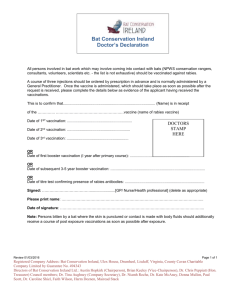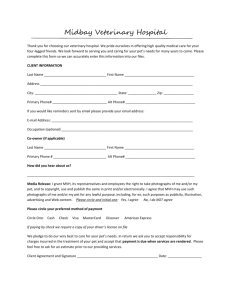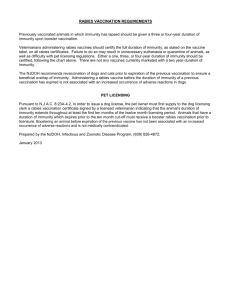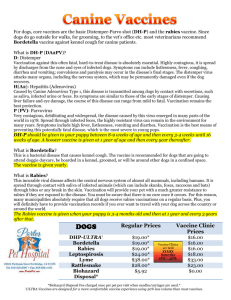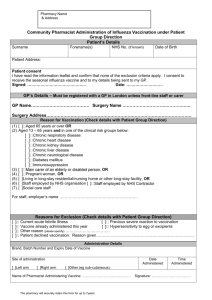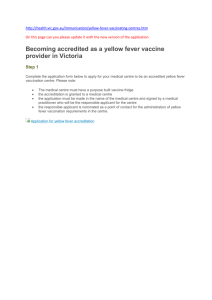doctor`s declaration - Northumberland Bat Group
advertisement
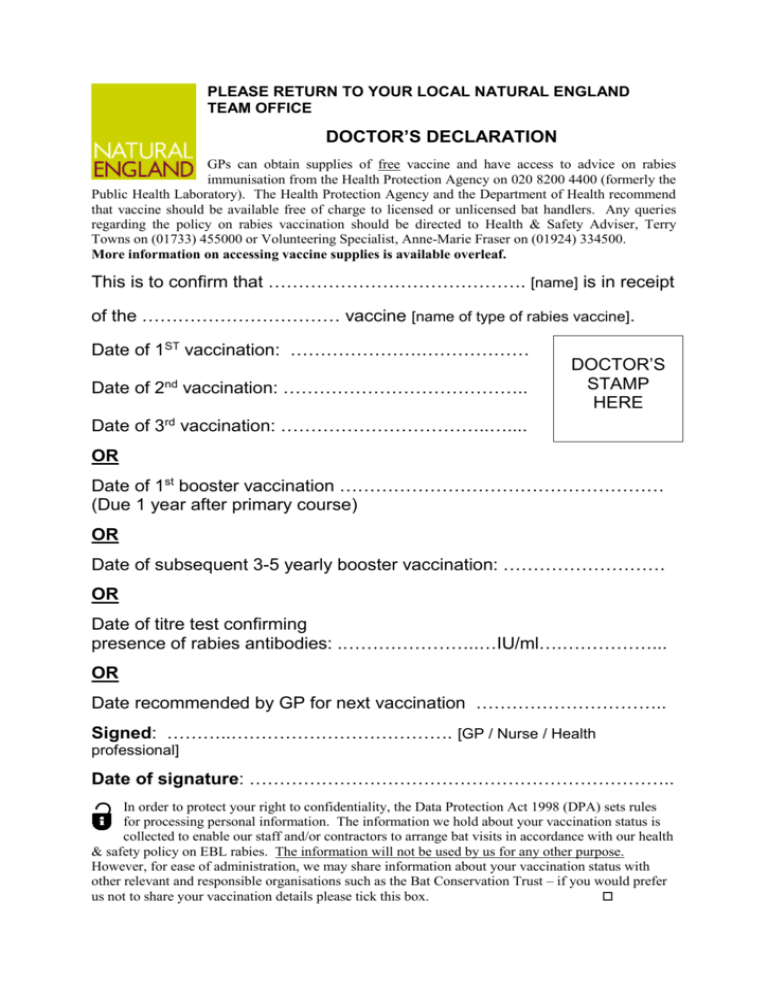
PLEASE RETURN TO YOUR LOCAL NATURAL ENGLAND TEAM OFFICE DOCTOR’S DECLARATION GPs can obtain supplies of free vaccine and have access to advice on rabies immunisation from the Health Protection Agency on 020 8200 4400 (formerly the Public Health Laboratory). The Health Protection Agency and the Department of Health recommend that vaccine should be available free of charge to licensed or unlicensed bat handlers. Any queries regarding the policy on rabies vaccination should be directed to Health & Safety Adviser, Terry Towns on (01733) 455000 or Volunteering Specialist, Anne-Marie Fraser on (01924) 334500. More information on accessing vaccine supplies is available overleaf. This is to confirm that ……………………………………. [name] is in receipt of the …………………………… vaccine [name of type of rabies vaccine]. Date of 1ST vaccination: ………………….……………… Date of 2nd vaccination: ………………………………….. DOCTOR’S STAMP HERE Date of 3rd vaccination: ……………………………..….... OR Date of 1st booster vaccination ……………………………………………… (Due 1 year after primary course) OR Date of subsequent 3-5 yearly booster vaccination: ……………………… OR Date of titre test confirming presence of rabies antibodies: .…………………..…IU/ml….……………... OR Date recommended by GP for next vaccination ………………………….. Signed: ………..………………………………. [GP / Nurse / Health professional] Date of signature: …………………………………………………………….. In order to protect your right to confidentiality, the Data Protection Act 1998 (DPA) sets rules for processing personal information. The information we hold about your vaccination status is collected to enable our staff and/or contractors to arrange bat visits in accordance with our health & safety policy on EBL rabies. The information will not be used by us for any other purpose. However, for ease of administration, we may share information about your vaccination status with other relevant and responsible organisations such as the Bat Conservation Trust – if you would prefer us not to share your vaccination details please tick this box. Guidelines for rabies booster vaccination of bat workers at continuous risk of exposure These are condensed from the 2006 revised rabies chapter (Chapter 27) in the Department of Health’s Immunisation against Infectious Disease: http://www.dh.gov.uk/en/Publichealth/Healthprotection/Immunisation/Greenbook/dh_4097254 . For primary immunisation, three doses of rabies vaccine should be given on days 0, 7 and 28 by intramuscular injection in the deltoid region. A single booster should be given one year after the primary course and subsequent boosters at 3-5 yearly intervals. 1. Timing of First booster Antibody levels fall after immunisation with rabies inactivated vaccines. The speed of this decline is vaccine specific, and is faster after primary immunisation than after subsequent boosters. It is rational, therefore, to have different policies for the intervals between the primary course and the first booster than between the first and subsequent booster vaccinations. New guidance (2005) recommends that the first booster be given one year after the primary rabies vaccination course, irrespective of whether 3 or 5 doses of vaccine were given for the primary course. 2. Subsequent boosters Once a first booster has been received, antibody levels seemed to be maintained in the longer term and boosters for those who remain at ongoing risk can be given every 3-5 years. 3. The role of serology (antibody testing, or titre tests) Blood tests are not routinely recommended. Serology is currently only recommended for those who have had a severe reaction to a previous dose of vaccine. The likelihood of a reaction to rabies vaccination, such as painful swelling of the vaccination site or, less commonly, fever and other flu-like symptoms, increases with increasing number of doses and is the most frequent reason for wanting to delay boosting. Further advice can be obtained via your GP from the HPA Centre for Infections (telephone 020 8200 6868) The interpretation of results is not straightforward and should be done in the context of an individual’s medical history. However, as in general if antibody levels are: Less than 0.5 IU/ml then boosting is required immediately. 0.5 IU/ml or more but less than 30 IU/ml then boosting can be delayed by 1 year. Above 30 IU/ml then boosting can probably be delayed by 3 years Please note that this is what is proposed by the HPA, rather than official government policy, but it is similar to policy in other countries such as France. 4. Access to advice and vaccine (for occupational vaccination) and post-exposure vaccine and immunoglobulin Vaccine for bat workers is available free of charge from the Health Protection Agency. For pre-exposure (occupational) requests GPs need to send a fax with details of the patient’s name, date of birth, the name of the conservation group (e.g. Natural England), and their full vaccination history to: Vaccine Clerk, Rabies Office, HPA Virus Reference Department Fax 020 8200 1569 For post-exposure vaccine and/or advice please contact your local HPA Health Protection Unit (find your local unit through http://www.hpa.org.uk/lars_hpus.htm) or the Duty Doctor at the HPA Centre for Infections (telephone 020 8200 6868) 5. Access to serological testing (antibody or titre levels) Testing is carried out by the Rabies Virology Department, Veterinary Laboratories Agency – Weybridge via your local laboratory. Further information Department of health guidance on rabies vaccination can be found in Chapter 27 of The Green Book: http://www.dh.gov.uk/en/Publichealth/Healthprotection/Immunisation/Greenbook/dh_4097254 Health Protection Agency guidance for duty doctors (including post exposure treatment): http://www.hpa.org.uk/infections/topics_az/rabies/HPA_Rabies_protocol_April2006.pdf
